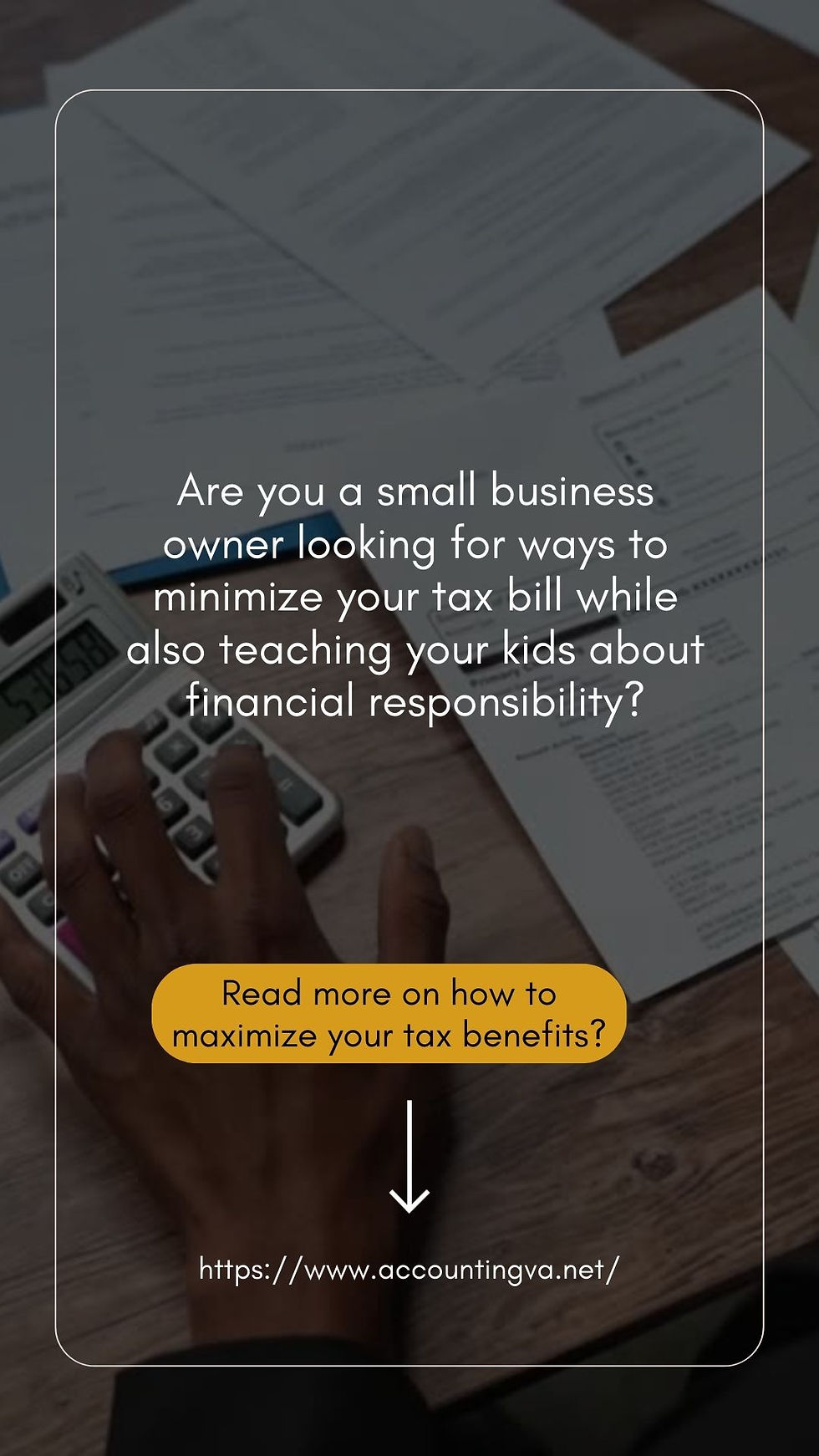How to Pay Your Kids and Get a business Deduction
- catherine kihiu

- Feb 19, 2024
- 3 min read
Updated: Feb 28, 2024

I write this blog for our DIY (do it yourself) community, where I discuss the four primary reasons why you may want to consider this tax-saving strategy:
1. Why Pay Your Kids?
2. Type of Work Kids Can Do
3. How to Pay Your Kids (Documents Necessary)
4. Tax Benefit of Paying Your Kids
Are you a small business owner looking for ways to minimize your tax bill while also teaching your kids about financial responsibility? Paying your children for legitimate work within your business can be a smart strategy to achieve both goals. Not only does it provide valuable lessons in work ethic and money management, but it can also offer tax advantages through business deductions. In this blog post, we'll explore how paying your kids can benefit your business and help you maximize tax savings.
Why Pay Your Kids?
Paying your children for work they do in your business has several benefits:
- Tax Deductions: By employing your children, you can shift income from your higher tax bracket to their lower tax bracket, potentially reducing your overall tax liability.
- Financial Education: Paying your kids for work teaches them the value of money, work ethic, and financial responsibility from a young age.
- Business Assistance: Your children can provide valuable assistance in your business, whether it's helping with administrative tasks, social media management, or other age-appropriate responsibilities.
Types of Work Kids Can Do
The type of work your children can perform will depend on their age, skills, and the nature of your business. Here are some examples:
- Administrative Tasks: Filing, organizing paperwork, data entry, and other office tasks.
- Customer Service: Answering phones, responding to emails, or providing customer support.
- Marketing Assistance: Helping with social media management, content creation, or graphic design.
- Maintenance and Cleaning: Cleaning the office space, organizing inventory, or maintaining equipment.
- Special Projects: Assisting with specific projects or research tasks as needed.
How to Pay Your Kids
- Establish a Formal Employment Relationship: Treat your child's employment like any other employee. Have them fill out a W-4 form for tax withholding purposes and keep accurate records of their work hours and tasks performed.
- Set a Reasonable Wage: Pay your children a fair wage based on the type of work they do and prevailing rates in your area. The wage should reflect the value of their contributions to the business.
- Pay Regularly: Pay your children on a regular schedule, just like you would any other employee. This helps instill a sense of responsibility and consistency.
- Document the Work: Keep detailed records of the work your children perform, including timesheets, task lists, and any relevant documentation.
- Comply with Labor Laws: Ensure that the work your children are doing complies with child labor laws in your state. There may be restrictions on the type of work they can perform or the number of hours they can work.
Tax Benefits of Paying Your Kids
Paying your children can result in several tax benefits for your business:
- Business Deductions: You can deduct the wages you pay to your children as a business expense, reducing your taxable income.
- Lower Tax Bracket: Shifting income to your children can help you take advantage of their lower tax bracket, potentially reducing your overall tax liability.
- IRA Contributions: If your child earns income from your business, they may be eligible to contribute to an Individual Retirement Account (IRA), helping them start saving for retirement early.
Conclusion
Paying your children for work they do in your business can be a win-win situation. Not only does it provide valuable financial education and work experience, but it can also result in significant tax savings for your business. By following the guidelines outlined in this blog post and consulting with a tax professional, you can take advantage of this strategy to maximize your tax benefits while also investing in your children's future.
If interested, call us at 205-216-5481 or schedule a one-on-one consultation here: Calendly link"






Comments